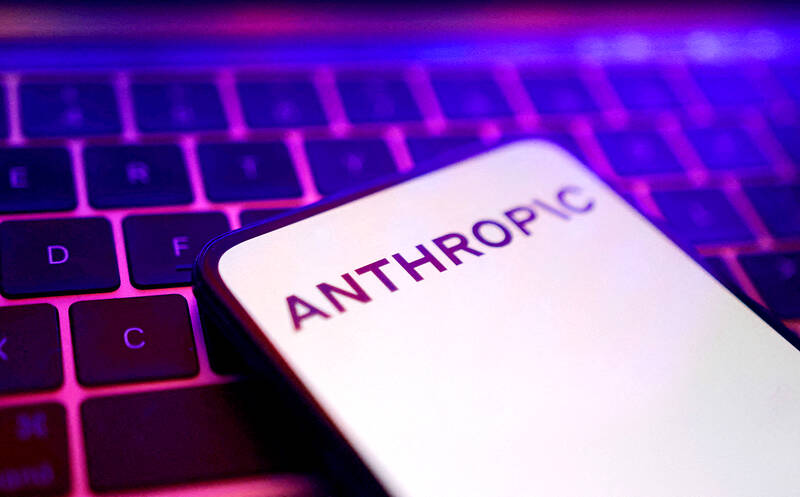Anthropic PBC is to pay at least US$1.5 billion to settle a US class-action lawsuit over allegedly using pirated books to train its artificial intelligence (AI) models, court documents filed on Friday showed.
“This landmark settlement far surpasses any other known copyright recovery,” plaintiffs’ attorney Justin Nelson said. “It is the first of its kind in the AI era.”
The settlement stems from a class-action lawsuit filed by authors Andrea Bartz, Charles Graeber and Kirk Wallace Johnson, who accused Anthropic of illegally copying their books to train Claude, the company’s AI chatbot that rivals ChatGPT.

Photo: REUTERS
In a partial victory for Anthropic, US District Court Judge William Alsup ruled in June that the company’s training of its Claude AI models with books — whether bought or pirated — so transformed the works that it constituted “fair use” under the law.
“The technology at issue was among the most transformative many of us will see in our lifetimes,” Alsup wrote in his decision, comparing AI training to how humans learn by reading books.
However, Alsup rejected Anthropic’s bid for blanket protection, ruling that the company’s practice of downloading millions of pirated books to build a permanent digital library was not justified by fair use protections.
“We remain committed to developing safe AI systems that help people and organizations extend their capabilities, advance scientific discovery and solve complex problems,” Anthropic deputy general counsel Aparna Sridhar said.
The settlement covers about 500,000 books, translating to roughly US$3,000 per work — four times the minimum statutory damages under US copyright law, the legal filing said.
Under the agreement, Anthropic would destroy the original pirated files and any copies made, although the company retains rights to books it legally purchased and scanned.
“This settlement sends a strong message to the AI industry that there are serious consequences when they pirate authors’ works to train their AI, robbing those least able to afford it,” Authors Guild CEO Mary Rasenberger said in a statement supporting the deal.
Anthropic competes with generative AI offerings from Google, OpenAI, Meta Platforms Inc and Microsoft Corp.
The settlement, which requires judicial approval, comes as AI companies face growing legal pressure over their training practices. A US judge in June handed Meta a victory over authors who accused the tech giant of contravening copyright law by training Llama AI on their creations without permission.
District Court Judge Vince Chhabria in San Francisco ruled that Meta’s use of the works to train its AI model was “transformative” enough to constitute “fair use” under copyright law.
Meanwhile, Apple Inc on Friday was targeted with a lawsuit by a pair of US authors accusing the iPhone maker of using pirated books to train generative AI built into its lineup of devices.
The tech titan’s suite of capabilities called “Apple Intelligence” is part of a move to show it is not being left behind in the AI race.
“To train the generative-AI models that are part of Apple Intelligence, Apple first amassed an enormous library of data,” the suit said. “Part of Apple’s data library includes copyrighted works — including books created by plaintiffs — that were copied without author consent, credit or compensation.”
Apple “scraped” works from sources including “shadow libraries” stocked with pirated books, the suit said.
The suit filed against Apple by Grady Hendrix, author of My Best Friend’s Exorcism, and Jennifer Roberson, whose books include Sword-Bound, seeks class action status.

KEEPING UP: The acquisition of a cleanroom in Taiwan would enable Micron to increase production in a market where demand continues to outpace supply, a Micron official said Micron Technology Inc has signed a letter of intent to buy a fabrication site in Taiwan from Powerchip Semiconductor Manufacturing Corp (力積電) for US$1.8 billion to expand its production of memory chips. Micron would take control of the P5 site in Miaoli County’s Tongluo Township (銅鑼) and plans to ramp up DRAM production in phases after the transaction closes in the second quarter, the company said in a statement on Saturday. The acquisition includes an existing 12 inch fab cleanroom of 27,871m2 and would further position Micron to address growing global demand for memory solutions, the company said. Micron expects the transaction to

Vincent Wei led fellow Singaporean farmers around an empty Malaysian plot, laying out plans for a greenhouse and rows of leafy vegetables. What he pitched was not just space for crops, but a lifeline for growers struggling to make ends meet in a city-state with high prices and little vacant land. The future agriculture hub is part of a joint special economic zone launched last year by the two neighbors, expected to cost US$123 million and produce 10,000 tonnes of fresh produce annually. It is attracting Singaporean farmers with promises of cheaper land, labor and energy just over the border.

US actor Matthew McConaughey has filed recordings of his image and voice with US patent authorities to protect them from unauthorized usage by artificial intelligence (AI) platforms, a representative said earlier this week. Several video clips and audio recordings were registered by the commercial arm of the Just Keep Livin’ Foundation, a non-profit created by the Oscar-winning actor and his wife, Camila, according to the US Patent and Trademark Office database. Many artists are increasingly concerned about the uncontrolled use of their image via generative AI since the rollout of ChatGPT and other AI-powered tools. Several US states have adopted

A proposed billionaires’ tax in California has ignited a political uproar in Silicon Valley, with tech titans threatening to leave the state while California Governor Gavin Newsom of the Democratic Party maneuvers to defeat a levy that he fears would lead to an exodus of wealth. A technology mecca, California has more billionaires than any other US state — a few hundred, by some estimates. About half its personal income tax revenue, a financial backbone in the nearly US$350 billion budget, comes from the top 1 percent of earners. A large healthcare union is attempting to place a proposal before